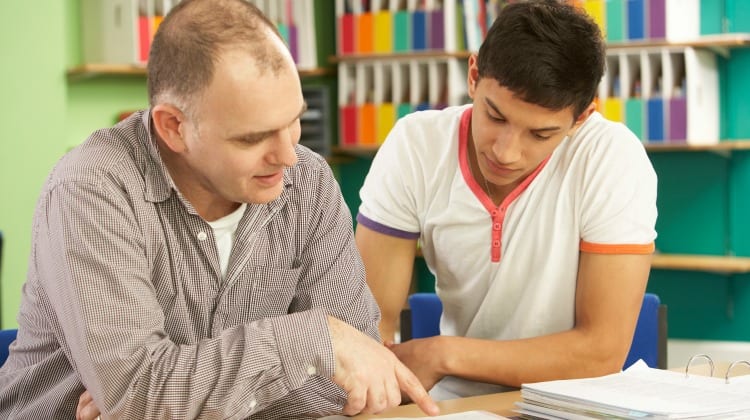Of all the worrisome adolescent behaviors that are considered “normal,” teen depression, thoughts of suicide, and feelings of hopelessness are not among them. Adults often dismiss signs of teen depression as normal adolescent angst while their children suffer in silence. But much of the suffering depressed teens experience can be prevented and treated. Girls frequently experience depression. If you the parent of a depressed girl and you seek lasting treatment for her, Falcon Ridge Ranch is the perfect place. Their terrific equine therapy program has made significant impact on the lives of young girls. If you are tired of going from counselors to counselors than get a lasting treatment once and for all. For more information contact their admission counselors at 1-866-452-8775. Cognitive-Behavioral Therapy Proven Effective A large study which appears in the June 3 issue of the Journal of the American Medical Association reports that positive thinking and coping strategies taught in a cognitive-behavioral therapy (CBT) program help prevent depression in teens. “We know that these kids tend to interpret situations in overly negative ways,” study co-author Gregory N. Clarke, PhD, told WebMD. “The idea is to teach them the skills they need to keep unrealistic thinking from snowballing into full-blown depression.” Other studies have shown that a combination of CBT and an antidepressant medication is more effective for treating major depression than either treatment alone. Compared to study participants who did not receive CBT sessions to challenge their negative thinking: • Those who received CBT were less likely to develop depression during the course of the study, with about one in five (21%) experiencing new depressive episodes compared to one in three (33%). • The impact of CBT was most notable in teens who did not have a parent who was depressed at the time, with 12% of these teens developing depression compared to 40% of teens who did not go through the CBT program. • The researchers estimated that CBT prevented one episode of depression for every nine teens treated – a risk reduction similar to that which has been reported for antidepressants.
Signs of Teen Depression
Common symptoms of teenage depression include: • Frequent sadness or crying – possibly demonstrated by wearing dark clothing, writing poems or journal entries with morbid themes, or listening to music with dark themes • Hopelessness – pessimism about the future, failure to maintain basic hygiene, giving up at school • Less interest in previously enjoyable activities – dropping out of school, sports, clubs, or other activities • Boredom or apathy – skipping school, low motivation, lack of energy • Isolation from friends or family – avoiding social gatherings, spending excessive time alone, refusing to talk about issues, difficulty maintaining friendships • Low self-esteem – feeling guilty, rejected, or insufficient, extreme feelings of unworthiness • Irritability or anger – lashing out at family members, acting sarcastic or critical, rejecting the efforts of others • Frequent complaints of physical illness, such as headaches and stomachaches • Academic underachievement – poor grades, skipping school, dropping out, difficulty concentrating on schoolwork • Change in eating or sleeping patterns – sleeping all day, staying up all night watching television, gaining or losing weight • Running away from home • Self-destructive behavior or comments about suicide – statements of intent to commit suicide, preoccupation with death, drug or alcohol abuse, self-injury or cutting Not Enough Teens Getting Depression Treatment Depression can be prevented and treated – the earlier, the better. Yet despite evidence that both cognitive-behavioral therapy and antidepressants help, very few adolescents receive any kind of treatment. A report by the Substance Abuse and Mental Health Services Administration (SAMHSA), suggests that nearly one in 10 American adolescents have experienced at least one bout of major depression in the past year, but only about 39 percent received treatment. One possible explanation is that teens are worried about the stigma attached to seeking treatment for depression. In a study appearing in the journal Medical Care of 368 teens, half of whom had been diagnosed with depression, the most commonly reported barriers to depression treatment were worries about stigma and the reactions of their family members. “With teenagers, treatment decisions greatly involve other parties, especially parents. For instance, teenagers often rely on adults for transportation. Doctors need a sense not just of what the teen thinks or what the parents thinks, but what both think,” study lead author Lisa Meredith said in a news release. Left untreated, depressed teens are more likely to have social and academic problems, engage in early sex with a higher risk of teen pregnancy, abuse drugs or alcohol, and commit suicide. Programs for Depressed Teens A number of specialized programs offer CBT and other therapies to treat teen depression and other emotional and behavioral issues. Programs that take teens away from home for a certain amount of time can be particularly beneficial if a parent is depressed and has created a difficult home environment. Therapeutic boarding schools offer intensive individual, group, and family therapy while allowing teens to continue their education in a structured, nurturing environment away from home. These private schools employ master’s and doctoral level counselors who can help teens develop essential coping skills and communication strategies that will benefit both the teen and his family. There are also a number of adolescent residential treatment centers that offer a blend of academics, traditional therapies like CBT, alternative therapies like equine therapy and art therapy, and esteem-building activities that reignite a passion for life. In these settings, teens actively work to overcome depression and behavioral issues so they can re-integrate into their families and communities in healthy ways. Depressed teens tend to grow into chronically depressed adults, causing years of unnecessary suffering and decreased productivity. Don’t let depression stand in the way of your teen developing healthy relationships, a positive self-image, and a healthy, balanced life. Depression is a knowable and treatable disease that can be overcome in as little as a few months to a year with appropriate treatment. https://www.byparents-forparents.com/parenting/treating-teen-depression.htm





